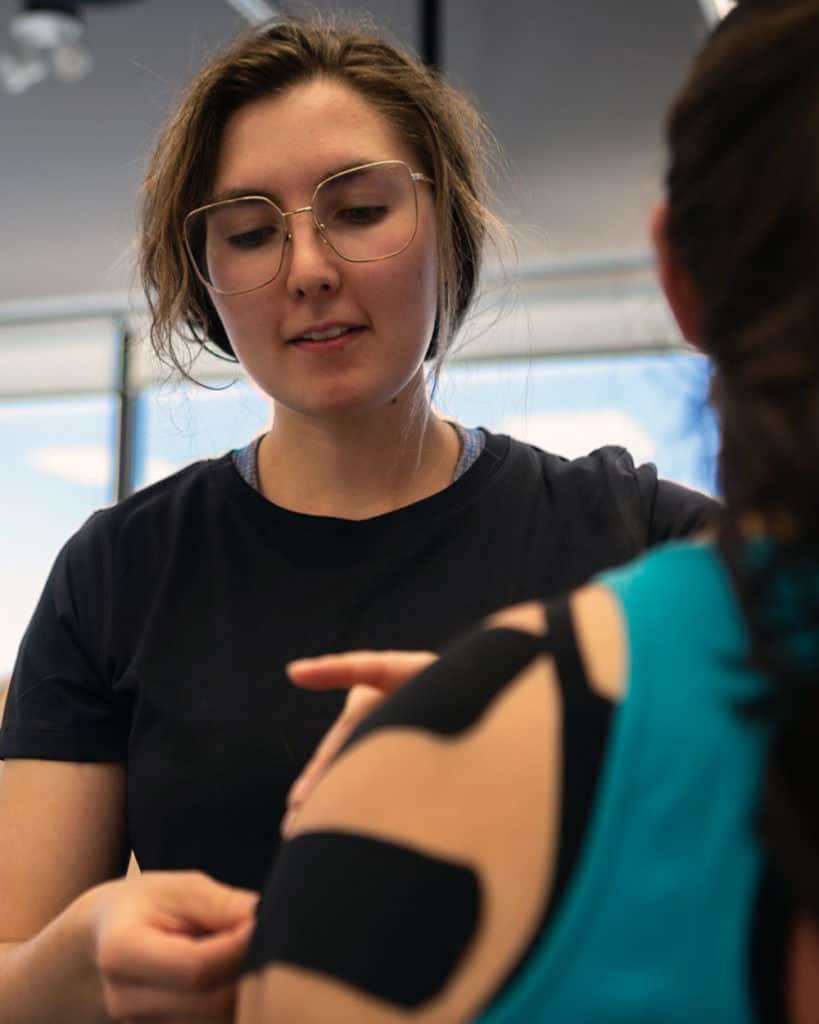
JaneApp Data Security Features: How Your Clinic’s Information Stays Protected
JaneApp Data Security Features: How Your Clinic’s Information Stays Protected Takeaways Jane is HIPAA- and PIPEDA- compliant Data is encrypted, whether at rest or in
Start Feeling Better In As Few As 3 Visits.
Did you know that physiotherapy is one of the most important treatments for women’s health? There are many conditions that can be treated with physiotherapy, including pelvic floor dysfunction, urinary incontinence, and chronic pain. In this blog post, we will discuss the different conditions that can be treated with women’s health physiotherapy and what to expect from treatment.
But first…What do women’s health physios do?
Women’s health physios are highly trained healthcare professionals who specialize in the assessment, diagnosis, and treatment of women’s health conditions. They work with women of all ages, from adolescence through to menopause and beyond. Women’s health physios help to manage a wide range of conditions, including pelvic floor disorders, incontinence, prolapse, sexual dysfunction, and pregnancy-related issues. They also provide advice on general wellness and healthy living. Women’s health physios play an important role in helping women to maintain their health and wellbeing throughout their lives.
Physiotherapy can help to strengthen the pelvic floor muscles and improve bladder control. It can also help to relieve pain and improve sexual function. Treatment usually involves exercises that are done at home as well as regular visits to the physiotherapist.

Tell us what hurts, and we will treat your pain in the shortest time possible. Get effective treatment for your condition in less than 30 minutes so you can get back to doing what you live… pain-free.
Get a personalized care plan so you can feel better in as few as 3 visits. We use advanced therapy techniques proven to ease pain, accelerate recovery, improve mobility and overall health.


Our team of licensed physiotherapists, chiropractors, registered massage therapists are professionals and in human anatomy and biomechanics. You will get the perfect care plan to target the root of your pain so you can get back to doing what you love, everyday!
This appointment is your opportunity to tell us what hurts and discover whether women’s health physiotherapy is a good fit for you! During this session, you will talk with a physiotherapist on a phone call (or online) and create the right care plan specifically for your pain. There is no obligation, this session is only to find out if physiotherapy can help you getting back to doing the things you love in life.
If you’re like most you don’t want to wait days or weeks to get treated for your pain. And you don’t want to have to spend your time calling nearby clinics to find the one who can see you the fastest.
That’s where PainHero comes In – Canada’s largest network of physiotherapists, chiropractors, and registered massage therapists.
Our Platform is used by clinics where they post their open appointment times. So you can quickly compare availability and wait times for clinics near you without having to pick up the phone. Then book an appointment within seconds and even see someone that day if you want. So you can get back to doing the things you love faster.
Plus unlike other sites who let anyone on or just rely on google reviews. We hand pick clinics based on a 50-point inspection, which includes everything from checking reviews, ratings, reputation, history, complaints, satisfaction, trust, cost, and general excellence.
Improve the way your body moves so you can continue to do the things you love. PainHero is Canada’s largest network of physiotherapists, chiropractors, and registered massage therapists. Our mission is to make it easy for you to find the top clinics in your community. We handpick the top clinics using our 50 point inspection based on patient reviews, complaints, and patient outcomes.
Whether you’re seeking pain relief or preventative care, you can expect our patient-centric approach to be new and different from any healthcare experience you’ve had before. Perhaps even life-changing.
1460+
Clinics
2172+
Caring Therapists
2M+
Patient Visits


There are many different conditions that can be treated with women’s health physiotherapy. These include:
Pelvic floor dysfunction – This is a condition where the pelvic floor muscles are dysfunctional or damaged. Physiotherapy can help to strengthen the muscles that improve bladder control.
Urinary incontinence – This is a condition where you leak urine when you cough, sneeze, or laugh. Physiotherapy can help to improve the muscles that control urination.
You see, one of the main functions of the pelvic floor muscles is to control bowel and bladder function. When these muscles are dysfunctional, it can lead to incontinence or difficulty going to the bathroom. Physiotherapy can help to strengthen and repair these muscles, restoring proper bowel and bladder control. In addition, physiotherapy can also help to retrain the muscles so that they can work properly again. This can be especially helpful for people who have had surgery or an injury that has affected their pelvic floor muscles. By working with a physiotherapist, patients can regain control over their bodies and improve their quality of life.
Chronic pelvic pain – This is a condition where you have long-term pain in the pelvis. Physiotherapy can help to relieve pain and improve local function.
Postpartum recovery – Having a baby is an amazing experience, but it can also be a lot of work. Your body goes through some big changes during pregnancy and childbirth, and it can take a little while to adjust. That’s where women’s health physiotherapy comes in. Physiotherapists who specialize in women’s health can help you recover from the physical stressors of pregnancy and childbirth, and get your body back to its pre-pregnancy state. They can also provide advice on how to avoid injuries during postpartum recovery, and help you manage any pain or other symptoms you may be experiencing. If you’re looking for support during postpartum recovery, women’s health physiotherapy may be the answer.
Interstitial cystitis (IC) – is a chronic condition that causes pain and pressure in the bladder. The cause of IC is not fully understood, but it is thought to be related to inflammation or damage to the bladder lining. Symptoms of IC can include urinary frequency, urgency, and pain in the pelvic region. The good news is that physiotherapy can help to manage symptoms and improve quality of life for people with IC. Physiotherapists use a variety of techniques, such as myofascial release and pelvic floor muscle training to help relieve pain and improve bladder function.
Endometriosis – is a common women’s health condition that can cause pain and other symptoms. Physiotherapy can be an effective treatment for endometriosis, helping to reduce pain and improve quality of life.
What is pelvic floor dysfunction courtesy of Total Rehabilitation and Chiropractic Centre – Thornhill. (Read the caption)

Pelvic pain is a common symptom that can be caused by a variety of conditions. If you are experiencing pelvic pain, physiotherapy can help to identify the cause and provide relief. Physiotherapy treatment for pelvic pain usually involves a combination of techniques, such as myofascial release, trigger point release, and stretching. In addition, your physiotherapist may also recommend a pelvic floor muscle training program to help improve the muscles that support the pelvis. If you are living with pelvic pain, physiotherapy can help you find relief and get you back to your regular activities.
Find out whether women’s health physiotherapy can help you get back to doing the things you love in life.
Chronic pelvic pain is a debilitating condition that affects millions of women worldwide. While the exact cause of chronic pelvic pain is often difficult to determine, there are several potential contributing factors. One of the most common causes of chronic pelvic pain is endometriosis. This condition occurs when the endometrial tissue that lines the inside of the uterus starts to grow outside of the organ. This can lead to the formation of cysts, scar tissue, and other abnormalities that can cause severe pain. Other potential causes of chronic pelvic pain include fibroids, pelvic inflammatory disease, and ovarian cancer. Many women also experience Pelvic floor dysfunction which can be caused by childbirth, surgery, or other trauma to the pelvic region. While the exact cause of chronic pelvic pain is often elusive, there are a variety of treatments available that can provide relief.
Pelvic floor courtesy of The Cheerful Pelvis (Read the caption)
The next most common reason women see a pelvic floor physiotherapist is for pre and post pregnancy care.
Pelvic floor physiotherapists help women cope with the physical changes that occur during pregnancy, such as increased back pain. They also help women to prepare for childbirth by providing advice on exercises that can help to improve their strength and flexibility. In addition, pregnancy physiotherapists can provide support and guidance on postnatal recovery. They can help women to regain their strength and fitness after giving birth, and they can also provide advice on how to manage any ongoing health conditions.
Physiotherapy can also be used to treat pregnancy-related conditions such as back pain and pelvic girdle pain.
Pelvic girdle pain (PGP) is a common condition that can cause discomfort and pain in the hips, lower back, and legs. However, physiotherapy can be an effective treatment for PGP, helping to relieve pain and improve mobility. One of the most important aspects of physiotherapy for PGP is education. Sufferers need to learn about their condition and how to manage it. This includes learning how to identify and avoid triggers for pain, as well as understanding the importance of exercise and activity modifications. In addition, physiotherapy can help to strengthen the muscles around the pelvis, which can provide support and stability. Exercises that focus on the deep abdominal muscles can also be beneficial. By working with a physiotherapist, patients with PGP can develop an individualized treatment plan that offers relief from pain and helps them to regain their quality of life.
In addition, women’s health physiotherapy can help to improve posture habits, reduce stress, and increase stamina during pregnancy and childbirth.
As a result, pregnancy physiotherapy can play a vital role in supporting women throughout their pregnancy journey.
Now you may be thinking…
A pelvic floor physiotherapy assessment is an examination of the pelvic floor muscles and tissues. The therapist will assess the strength and flexibility of the muscles, as well as the function of the nerves that supply those structures. The therapist will also check for any abnormalities in the structure of the pelvis. A thorough assessment can help to identify any problems that may be causing pain or dysfunction. It can also help to determine the best course of treatment. Typically, a pelvic floor physiotherapy assessment will involve a combination of a physical examination, medical history taking, and questions about symptoms.

Treatment usually involves exercises that are done at home as well as regular visits to the physiotherapist. The exercises will help to strengthen the pelvic floor muscles and improve bladder control. You may also be given advice on how to change your lifestyle to reduce the risk of urinary incontinence or pelvic organ prolapse. Treatment can take several months, but you should start to see improvements after a few weeks.
So there you have it! The ultimate guide to women’s health physiotherapy. If you are suffering from any of the conditions mentioned above, then don’t hesitate to contact a physiotherapist to discuss treatment options. You can use the search box on this page to find a top pelvic health physiotherapy clinic near you.
Signs you may have an overactive pelvic floor courtesy of Impact Healthcare. (Read the caption)

JaneApp Data Security Features: How Your Clinic’s Information Stays Protected Takeaways Jane is HIPAA- and PIPEDA- compliant Data is encrypted, whether at rest or in

JaneApp Reporting and Analytics: How Clinics Can Track Growth and Performance Takeaways Jane’s reports are super underrated, they give you real insight into how your

JaneApp Customer Support: How to Get the Help Your Clinic Needs Takeaways Use the in-app chat first if you can Email is fine, but be
Gynaecological physiotherapy is a branch of women’s health physiotherapy that focuses on the treatment of conditions related to the female reproductive system. Gynaecological physiotherapists work with women of all ages, from adolescence through to menopause and beyond. They help to manage a wide range of conditions, including pelvic floor disorders, incontinence, prolapse, sexual dysfunction, and pregnancy-related issues. They also provide advice on general wellness and healthy living.
The pain associated with pelvic floor disorders can vary depending on the condition. For example, women with pelvic organ prolapse may experience a sense of fullness or pressure in the vagina, while those with interstitial cystitis may feel a burning sensation during urination. Pelvic floor muscle spasms can cause pain in the lower abdomen, buttocks, or thighs. The pain may be constant or intermittent, and it may worsen with certain activities such as sitting for long periods of time or during sexual intercourse.
Pelvic pain can be a symptom of a wide range of health conditions, from minor annoyances like indigestion to more serious problems like endometriosis. So how can you tell if your pelvic pain is something to worry about? In general, you should see a doctor if the pain is severe, lasts for more than a few days, or is accompanied by other symptoms like fever or bleeding. If the pain is unbearable or you have any concerns about your health, don’t hesitate to seek medical attention. However, even if the pain turns out to be harmless, it’s always best to err on the side of caution.

Taylor is a physiotherapist at The Orthopaedic Therapy Clinic located in Toronto, Ontario. He treats patients with various musculoskeletal conditions using patient education, exercise therapy, manual therapy and acupuncture. His treatment philosophy involves giving his patient’s the means to self-manage their injuries. He does this through reassurance, education and health promotion. Taylor uses the same principles as a patient educator at Pain Hero. He aims to provide you with high-quality, easy to understand information to teach you about your condition and how to improve it.
Women’s Health Physiotherapy is one of several possible methods for relieving pain that do not rely on prescription medications and all the side effects and baggage they come with. Not to mention that most drugs can only mask pain, but rarely address root causes. Find a clinic if you are suffering from muscle tightness, soreness, or pain to improve your quality of life, today.
